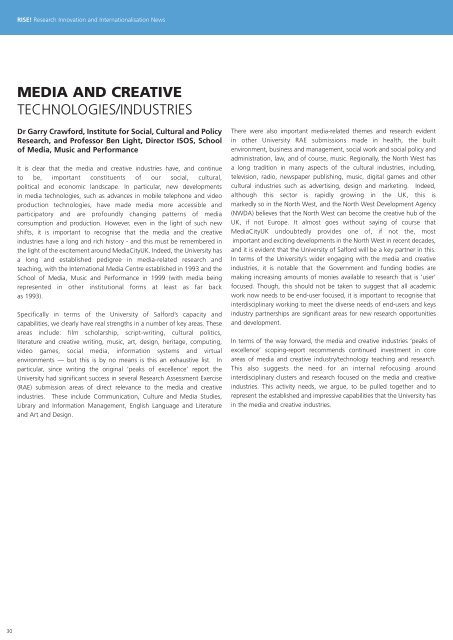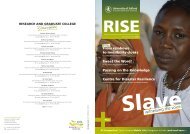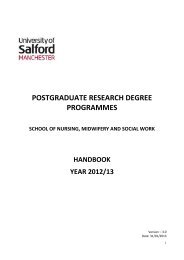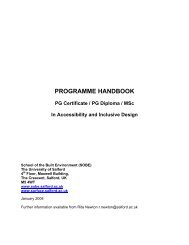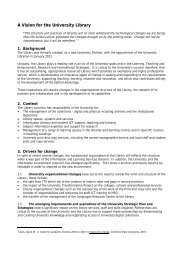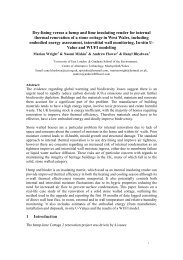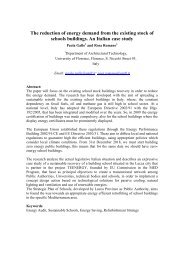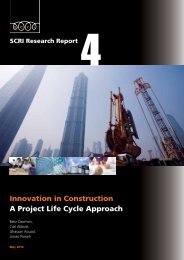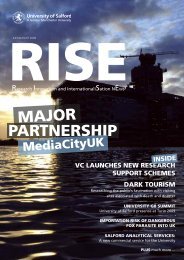RISE May-June 2009 - University of Salford
RISE May-June 2009 - University of Salford
RISE May-June 2009 - University of Salford
You also want an ePaper? Increase the reach of your titles
YUMPU automatically turns print PDFs into web optimized ePapers that Google loves.
<strong>RISE</strong>! Research Innovation and Internationalisation News<br />
MEDIA AND CREATIVE<br />
TECHNOLOGIES/INDUSTRIES<br />
Dr Garry Crawford, Institute for Social, Cultural and Policy<br />
Research, and Pr<strong>of</strong>essor Ben Light, Director ISOS, School<br />
<strong>of</strong> Media, Music and Performance<br />
It is clear that the media and creative industries have, and continue<br />
to be, important constituents <strong>of</strong> our social, cultural,<br />
political and economic landscape. In particular, new developments<br />
in media technologies, such as advances in mobile telephone and video<br />
production technologies, have made media more accessible and<br />
participatory and are pr<strong>of</strong>oundly changing patterns <strong>of</strong> media<br />
consumption and production. However, even in the light <strong>of</strong> such new<br />
shifts, it is important to recognise that the media and the creative<br />
industries have a long and rich history - and this must be remembered in<br />
the light <strong>of</strong> the excitement around MediaCityUK. Indeed, the <strong>University</strong> has<br />
a long and established pedigree in media-related research and<br />
teaching, with the International Media Centre established in 1993 and the<br />
School <strong>of</strong> Media, Music and Performance in 1999 (with media being<br />
represented in other institutional forms at least as far back<br />
as 1993).<br />
Specifically in terms <strong>of</strong> the <strong>University</strong> <strong>of</strong> <strong>Salford</strong>’s capacity and<br />
capabilities, we clearly have real strengths in a number <strong>of</strong> key areas. These<br />
areas include: film scholarship, script-writing, cultural politics,<br />
literature and creative writing, music, art, design, heritage, computing,<br />
video games, social media, information systems and virtual<br />
environments — but this is by no means is this an exhaustive list. In<br />
particular, since writing the original ‘peaks <strong>of</strong> excellence’ report the<br />
<strong>University</strong> had significant success in several Research Assessment Exercise<br />
(RAE) submission areas <strong>of</strong> direct relevance to the media and creative<br />
industries. These include Communication, Culture and Media Studies,<br />
Library and Information Management, English Language and Literature<br />
and Art and Design.<br />
There were also important media-related themes and research evident<br />
in other <strong>University</strong> RAE submissions made in health, the built<br />
environment, business and management, social work and social policy and<br />
administration, law, and <strong>of</strong> course, music. Regionally, the North West has<br />
a long tradition in many aspects <strong>of</strong> the cultural industries, including,<br />
television, radio, newspaper publishing, music, digital games and other<br />
cultural industries such as advertising, design and marketing. Indeed,<br />
although this sector is rapidly growing in the UK, this is<br />
markedly so in the North West, and the North West Development Agency<br />
(NWDA) believes that the North West can become the creative hub <strong>of</strong> the<br />
UK, if not Europe. It almost goes without saying <strong>of</strong> course that<br />
MediaCityUK undoubtedly provides one <strong>of</strong>, if not the, most<br />
important and exciting developments in the North West in recent decades,<br />
and it is evident that the <strong>University</strong> <strong>of</strong> <strong>Salford</strong> will be a key partner in this.<br />
In terms <strong>of</strong> the <strong>University</strong>’s wider engaging with the media and creative<br />
industries, it is notable that the Government and funding bodies are<br />
making increasing amounts <strong>of</strong> monies available to research that is ‘user’<br />
focused. Though, this should not be taken to suggest that all academic<br />
work now needs to be end-user focused, it is important to recognise that<br />
interdisciplinary working to meet the diverse needs <strong>of</strong> end-users and keys<br />
industry partnerships are significant areas for new research opportunities<br />
and development.<br />
In terms <strong>of</strong> the way forward, the media and creative industries ‘peaks <strong>of</strong><br />
excellence’ scoping-report recommends continued investment in core<br />
areas <strong>of</strong> media and creative industry/technology teaching and research.<br />
This also suggests the need for an internal refocusing around<br />
interdisciplinary clusters and research focused on the media and creative<br />
industries. This activity needs, we argue, to be pulled together and to<br />
represent the established and impressive capabilities that the <strong>University</strong> has<br />
in the media and creative industries.<br />
30


